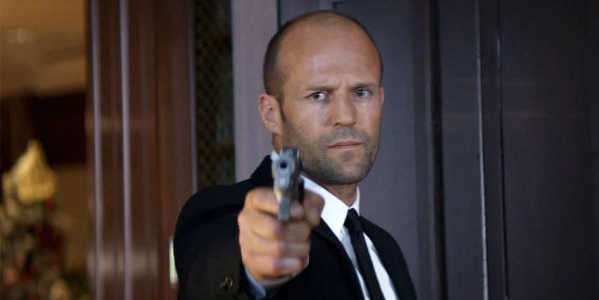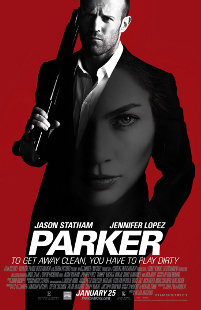Parker
Directed by Taylor Hackford
Written by John J. McLaughlin
USA, 2013
Perhaps the best thing about Taylor Hackford’s Parker is its unwavering compatibility with comfort. This is not to say that all films (even January releases) should strive for such middling appeal, but there’s something slightly charming about a genre outing that realizes it’s not reinventing the wheel while providing ample thrills in the process. Scribed by John J. McLaughlin from a novel by Donald E. Westlake, Parker is leagues away from the best of its kind, though its sporadic pulse and leisurely swagger are tuned in such a way that inhibits this film from being an outright mess. Glorified genre gratuitousness has often been tastier and classier, but Parker is able to partially glide off of the physical attributes of its main star and protagonist whose roundup of career genre outings have placed him near the top of Hollywood’s action A-list.
The film stars Jason Statham as the titular thief, a man who lives by a strict code of professional ethics where following through on your bond and avoiding chaos are one and the same. In what feels like a much less compelling knockoff of an Elmore Leonard novel, Parker’s sole duty is one of unkempt and unapologetic revenge. Statham wears scruffy like no one else as his character exists as a sort of distant relative to the job driven protagonists often found in the deliriously proficient universe of Michael Mann. All that we come to learn and really care to know about Parker is offered up in the film’s opening 15 minutes: his character here isn’t as stoically detailed-oriented as he is game for cashing in on big scores with no strings attached, and despite his line of work, the moral compass that Parker is defined by is one of communal grace and dignity. The film’s opening heist sets in motion the revenge laden plot which finds Parker being double-crossed and left for dead after he and his lackluster team steal a million in cash from an Ohio State Fair.
Parker’s assailants are comprised of a slew of characters actors: Michael Chiklis, Wendell Pierce, Clifton Collins Jr., and Micah A. Hauptman, each of whom have little to offer after they flee to Palm Beach, Florida in anticipation for their next job. The inclusion of Parker’s girlfriend Claire (Emma Booth) and her father Hurley (Nolte) add little stakes to the film, as each are routinely passed over as Parker begins his journey toward retribution. Parker’s arrival in West Palm signals the narrative’s most hackneyed passage due to the painfully obvious lack of chemistry he shares with co-star Jennifer Lopez’s, whose Leslie is a somewhat down on her luck real estate broker who’s used as a pawn in reintroducing Parker to those who betrayed him. Lopez is still equipped with the looks, but her presence here feels out of place and speaks to the script’s often choppy formulaic approach.
It should come as no surprise to learn that Parker barely runs off of the fumes of Statham’s featured physicality; the film’s complacent staging of its set pieces speaks to Hackford’s own middling status as a director. Where Parker does entertain, is in the bursts of gratuitousness that it often revels in. After Leslie offhandedly speaks to the staleness of her and Parker’s relations, we’re immediately subjected to an arousing knife fight that brings back in focus the film’s killing as clockwork mentality. By its end, Parker seemingly falters in its refusal to fully cash in on the exploits of Statham as it’s hindered by bouts of sluggish sex appeal (primarily in part to Lopez’s fatigued role) and the domestic framing of the narrative. What Parker does amount to is unabashed early year comfort food that is slightly more generous than it ought to be.
— Ty Landis



